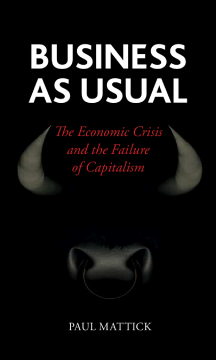
Additional Information
Book Details
Abstract
The recent global economic downturn has affected nearly everyone in every corner of the globe. Its vast reach and lingering effects have made it difficult to pinpoint its exact cause, and while some economists point to the risks inherent in the modern financial system, others blame long-term imbalances in the world economy. Into this debate steps Paul Mattick, who, in Business as Usual, explains the global economic downturn in relation to the development of the world economy since World War II, but also as a fundamental example of the cycle of crisis and recovery that has characterized capitalism since the early nineteenth century.
Mattick explains that today’s recession is not the result of a singular financial event but instead is a manifestation of long-term processes within the world economy. Mattick argues that the economic downturn can best be understood within the context of business cycles, which are unavoidable in a free-market economy. He uses this explanation as a springboard for exploring the nature of our capitalist society and its prospects for the future.
Although Business as Usual engages with many economic theories, both mainstream and left-wing, Mattick’s accessible writing opens the subject up in order for non-specialists to understand the current economic climate not as the effect of a financial crisis, but as a manifestation of a truth about the social and economic system in which we live. As a result the book is ideal for anyone who wants to gain a succinct and jargon-free understanding of recent economic events, and, just as important, the overall dynamics of the capitalist system itself.
“Business as Usual is a superb achievement. In this highly accessible book, Paul Mattick offers an outstanding theoretical and empirical account of the ongoing crisis, its devastating implications for the majority, and a brilliant indictment of the failures of mainstream economics at the levels of theory and policy guidance. Business as Usual also shows how and why these dismal failures should no longer deter the search for transformative alternatives.”
— Alfredo Saad-Filho, University of London“For anyone who is unsatisfied with the usual explanations of the current economic crisis – greed and fraud, deregulation, financialization, etc. —and is looking for a deeper explanation, this book is for you. Mattick demonstrates (without jargon and with great clarity) that the root causes of the current crisis lie in the fundamental nature and dynamics of capitalist economies, and places this crisis within the illuminating historical context of recurring capitalist crises since the early 19th century.” —Fred Moseley, Mount Holyoke College
— Fred Moseley“This lucid and thoughtful study is not just another important contribution to the rapidly expanding literature on the current economic crisis, though it is that as well. With historical depth and penetrating analysis, it seeks to reveal what is ‘wrong with the mainstream approach to understanding current economic affairs,’ tracing the roots of financialization of the economy and export of production with their increasingly harmful consequences, and the looming environmental crisis that overshadows everything, to their roots in fundamental structural features of the state capitalism that has taken many forms in the modern era. It provides a grimly realistic picture of what may lie ahead unless there is a radical transformation of the social order from production for profit to pursuit of human ends, based on ‘shared social decision-making . . . outside the constraints of the business economy,’ hence a major step towards true democracy.”
— Noam Chomsky"This is a fine book. It argues against the illusion that the current crisis is just a bonfire of contingent market forces, exposes economics as the dismal science that it is, and opposes the idea that capitalism is not some sort of economic mechanism that, if expertly regulated by those in the know, works well for the benefit of all. Mattick has to be congratulated not just for writing an immensely rich account of the current crisis but, also, for doing so with immense historical insight, theoretical cunning, and astute political judgement."
— Werner Bonefeld, University of YorkPaul Mattick is chair of the Department of Philosophy at Adelphi University in New York. He was previously the editor of the International Journal of Political Economy, and he is the author of Social Knowledge.
